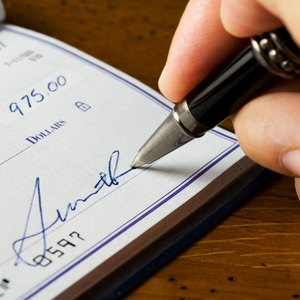
Paying for goods and services with a check written on a closed account is a serious offense that puts the perpetrator in legal jeopardy. If action isn’t taken right away to rectify the situation, consequences can range from a denial of further banking privileges to civil court, and even criminal prosecution. The actions you'll need to take depend on whether you are the one who wrote the bad check, or the one who received it.
Knowing the Stakes
Writing against a closed account is against the law. When someone writes a check, they’re making a legal commitment that the money is in the account, and the funds will be available for the other person to withdraw. If the check comes from a closed account, the action is often taken more seriously than a check that bounces as a result of insufficient funds because it can be seen as intent to defraud. Paying from a closed account not only results in increased fees for both parties in the transaction, it can make it more difficult for the perpetrator to get another checking account and can result in civil as well as criminal penalties.
Understanding Your Obligations
If you wrote a check from a closed account, the best thing you can do is to inform the other party – if they haven’t found out the hard way. Explain the situation, pay the debt (preferably in cash) and cover all fees as well. If you don't have the funds, be honest and make other arrangements, if possible. Don’t wait and hope the problem goes away, or the other party likely will assume the worst about your intentions and seek payment in more aggressive ways.
Contacting the Check Writer
If you were paid with a bad check, the first thing to do is reach out to the payer and inform them of the incident. It’s possible that the act was a mistake, whether because the person picked up the wrong checkbook from the desk drawer after recently changing accounts or because the account was closed without their knowledge. Accounts can be closed for cause if too many checks are bounced or a negative balance is too high, but they also can be closed for inactivity. Perhaps it’s an old account of rainy day funds that the financial institution assumed was abandoned.
Reporting the Perpetrator
If contacting the customer via phone doesn’t work, escalate the collection process. Send them a certified letter to demand payment and warn of further action. This is often a required step if you want to take legal action later. If that doesn’t work, you can request prosecution from the police or local district attorney, or use small claims court to collect the funds. Seek additional damages at this stage to reflect your increased time and expense, and consider reporting the check-writer to reporting systems to help others avoid being the victims in a similar incident.

